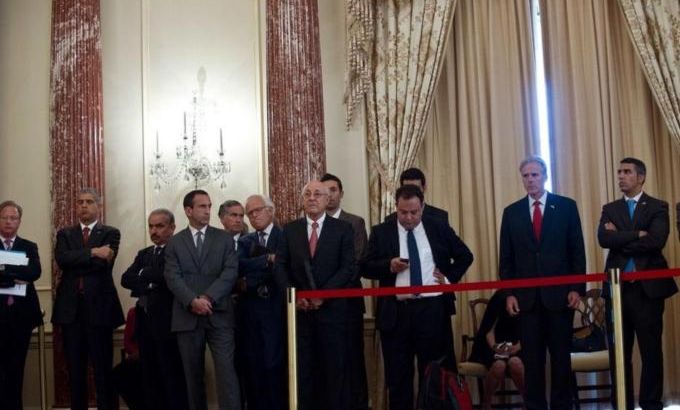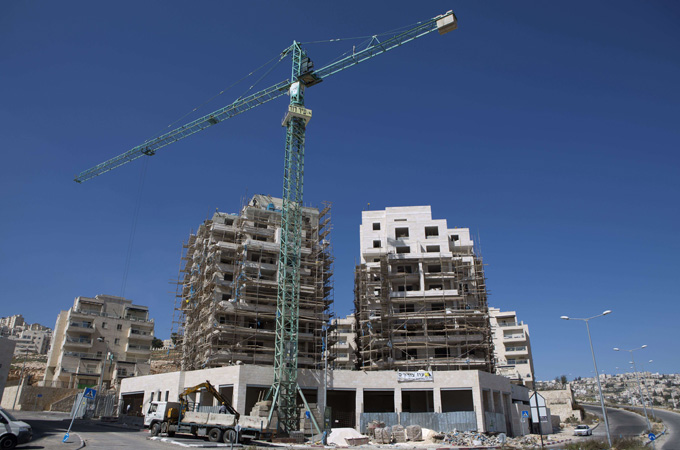Palestinians sceptical of new negotiations
US Secretary of State John Kerry says all “final status issues” will be discussed, but many Palestinians remain wary.

Nablus, Occupied West Bank – Abdallah Al-Houz stares blankly back over the counter at the grocery store where he works. “Negotiations? A long time,” he shrugs, before trailing off.
The soft-spoken 39-year-old shopkeeper from Nablus doesn’t have much faith in the soon-to-be renewed talks between Israeli and Palestinian leaders. “I don’t have trust in the negotiations, after 20 years,” he told Al Jazeera.
Earlier this week, Palestinian and Israeli officials met in Washington to publicly announce the resumption of negotiations towards a resolution of the conflict. The two sides have given themselves a nine-month timeframe to come to an agreement.
Speaking on condition of anonymity, a Palestinian official close to the negotiating team told Al Jazeera that more details will be released soon about how the negotiations will proceed, in time for their expected start in two weeks.
The official explained that the Palestinian leadership has frozen efforts for the next six months to appeal to the United Nations (UN) and other international bodies to hold Israel accountable, in an effort to get the negotiations off the ground.
“If we see that whatever is happening on the negotiating table or on the ground is not going to benefit our people, whether here or outside, we are free to use the other tools… If Israel tries, as they did in the past, to use the negotiating process as a smoke screen to hide more and more crimes, you can make sure that we are going to resume our UN path,” the official said.
The official added that while Palestinian skepticism to the negotiations is the natural result of 20 years of a failed peace process, the latest round of talks has already earned the release of over 100 pre-Oslo era Palestinian prisoners, and that “there is some room for hope”.
“Sometimes the question that people should ask is what kind of alternatives do they have?” the official said.
Final-status issues
In a statement Tuesday, US Secretary of State John Kerry said that all so-called “final-status issues” would be on the table: borders, security, Palestinian refugees and the status of Jerusalem.
Israel views Jerusalem as its “undivided and eternal” capital, while Palestinians want East Jerusalem as the capital of a future Palestinian state. In the holy city, the resumption of the so-called peace talks has left many Palestinians uneasy.
””People
, that they are going and resuming negotiations in spite of things going on as [usual].”]
“People don’t have that much hope that there will be some results,” explained Zakaria Odeh, director of the Civic Coalition for Defending Palestinian Rights in Jerusalem (CCDPRJ). “People are really very suspicious. People are not happy with the position of the [Palestinian Authority], that they are going and resuming negotiations in spite of things going on as [usual].”
Odeh told Al Jazeera that Palestinians in East Jerusalem think that Israel’s destructive policies in the city – including, the demolition of Palestinian homes, land confiscation, vast settlement expansion, and the revocation of identity cards – will likely continue undeterred throughout the talks.
“[Israel is] using [negotiations] as a cover for the implementation of [its] various policies… which put Jerusalem and the population of Jerusalem under a huge risk,” Odeh said.
The Popular Front for the Liberation of Palestine (PFLP), a leftist political faction within the Palestinian Liberation Organisation (PLO), has also come out against the resumption of negotiations.
On July 28, about 200 people attended a PFLP-led protest in Ramallah against the negotiations. The demonstration was met with excessive force from PA police and security officers, who used batons to disperse the crowd. Dozens of participants were injured, and five were arrested.
According to Ramallah-based prisoners’ rights group Addameer, the PA police’s response to the protest was “an illustration of the continuing political suppression that the PA practices against the Palestinian people despite their right to express their refusal of the PA’s policies.”
Palestinian citizens excluded
Shortly before the diplomatic process was formally underway, Israeli Prime Minister Binyamin Netanyahu announced that any peace agreement would be subject to a referendum vote among Israeli citizens. A bill is now being passed through the Israeli parliament, the Knesset, to cement this referendum into law.
“It is important that every citizen have a direct vote on fateful decisions such as these that will determine the future of the state,” Netanyahu said.
For Jafar Farah, director of the Mossawa Center, a Haifa-based group working for the rights of Israel’s Palestinian citizens, it is crucial that any agreement addresses the needs of Palestinian citizens of the state, especially since they will have a strong say in whether a referendum passes.
“This referendum may fail because the Arab community may boycott this referendum, because we have been sacrificed on the issue of negotiations,” Farah told Al Jazeera.
Israeli daily Ha’aretz reported this week that in a letter to the Israeli negotiating team, the US government affirmed Israel’s self-definition as a Jewish state. Recognising Israel as a Jewish state has long been a contentious issue, as it is unclear how this would affect the country’s non-Jewish, Palestinian citizens.
Still, Farah said Palestinian citizens are most concerned with getting an agreement that creates two states with open borders between them, rather than two states divided by walls and closed borders.
“This will be a big challenge if the agreement… will be much more we are there and [others] are here, much more Jewish state than peace agreement. There is a difference between the whole idea of peace-based separation and peace-based co-existence.”
Fear of repeating Oslo mistakes
Direct negotiations between Israeli and Palestinian leaders have been stalled for years, as Palestinians refused to return to the negotiating table unless Israel froze construction in its illegal Jewish-only settlements in the occupied Palestinian territories.
 |
| The ongoing construction of illegal Israeli settlements has been a cause for concern among Palestinians [AFP] |
The last major agreement signed between the two parties was the 1993 Oslo Accords agreement, which was meant to be a five-year, interim agreement, but is still in place today after nearly 20 years. Oslo is largely seen as a failure by Palestinians, and is blamed for leaving more than 60 percent of the occupied West Bank under Israeli control, inextricably tying the struggling Palestinian economy to Israel, and allowing Israeli settlements to expand at unprecedented rates.
Indeed, according to Israeli human rights group Btselem, since 1993, the year Oslo was signed, the Israeli settler population in the West Bank – not including East Jerusalem – nearly tripled, from 110,900 to 301,200. The entire settler population – including East Jerusalem – went from 241,000 to over 500,000 in that same period.
Fears that a similar jump in settlement construction will occur during the upcoming round of negotiations are widespread. And those fears aren’t unfounded. The Israeli daily Maariv reported this week that PM Netanyahu promised to approve thousands of new housing units in settlements in the West Bank and East Jerusalem, to appease right-wing factions within his coalition government who were against entering into negotiations.
“[Palestinian negotiators] didn’t learn at all from their mistakes 20 years ago,” said Alaa Tartir, programme director at Al-Shabaka, the Palestinian policy network.
Tartir told Al Jazeera that it is crucial to recognise that negotiations will not be between two equals, but rather between an oppressor and the oppressed. He added that while negotiations aren’t in and of themselves negative, they must be used in combination with other tactics, like grassroots resistance, boycotts, international solidarity, and civil society pressure.
“The problem with the PA is that they are suppressing very actively and consciously any other form [of resistance] other than negotiations,” Tartir said.
“All their decisions will affect us, the young Palestinians who constitute the majority of the Palestinian people. We as Palestinian people are not consulted in this. We are thoroughly marginalised and it means nothing if the negotiators agree in Washington today on something, and the people and the masses on the ground disagree. It’s useless peace accords.”